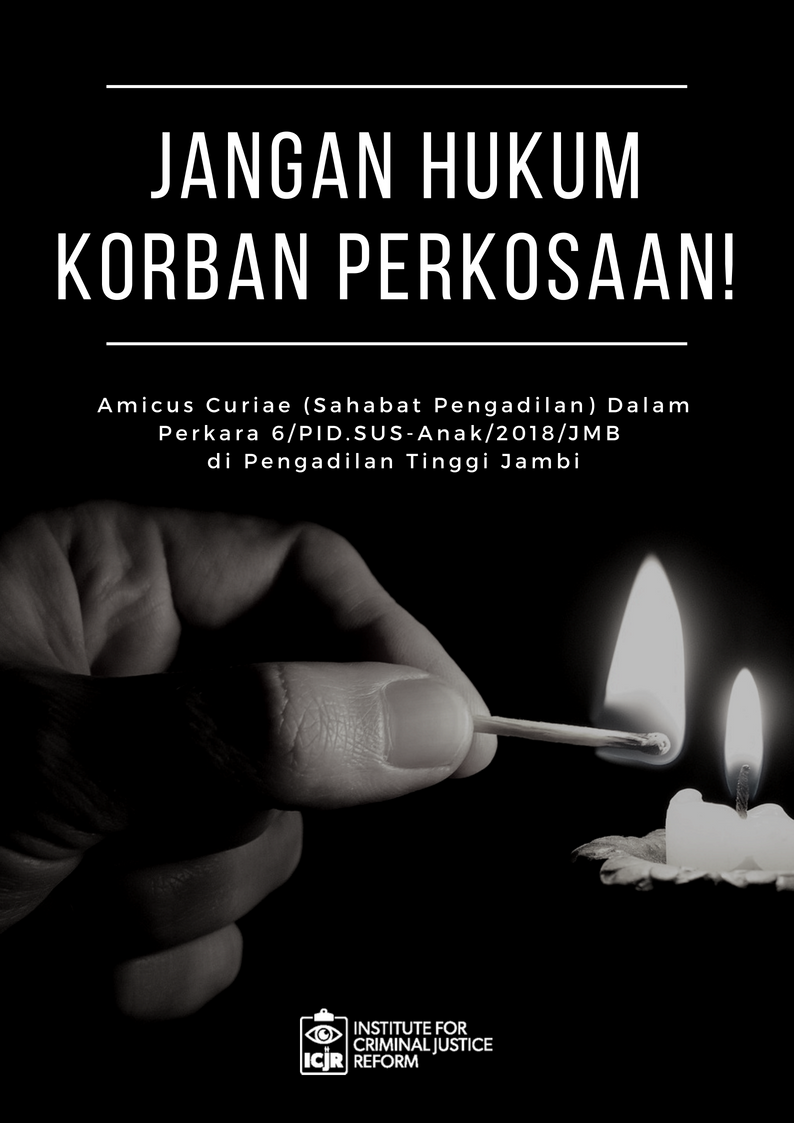On Monday, 6 August 2018, ICJR has sent Amicus Curiae (Friend of the Court) Letter to the Jambi High Court for the Case of a minor (hereinafter X) who received 6 months of imprisonment as ruled in the Muara Bulian District Court for abortion (case number 6/PID.SUS-Anak/2018/JMB). Whereas, the pregnancy was the result of rape by X’s brother which was done 9 times.
“Amicus curiae” or “Friends of the Court” is a Roman-derived legal tradition, which was then developed and practiced in the common law. Through this Amicus Curiae Letter, the court is given permission to receive-invite third parties to provide legal information or facts relating to unfamiliar issues on the trials.
Amicus Curiae is a supportive approach for a court in trying a case. ICJR in this matter is a non-party with an interest in this case based on the ICJR’s long practices, activities and focus in criminal justice reform. ICJR has often sent Amicus Curiae Letters in various cases, so the sent Letter is hoped to assist the Judges’ consideration in ensuring justice for the minor rape victim in Muara Bulian, Jambi.
In that respect, ICJR views that:
Firstly, there were various violations of procedural law in the Muara Bulian District Court Decision, namely:
- The court proceeding violates Article 3 of Law No.11 of 2012 on Child Criminal Justice System concerning children’s right to effective legal assistance. In this case, the letter of appointment for legal assistance (5/Pen.Pid.Sus-Anak/2018/Pn.Mbn) only been released on 9 July 2018, the date when the first trial was held;
- Although there was a lawyer who assisted X during the court proceedings, there was no effort by the court to provide an effective and credible legal assistance. In the trials agenda, the best interest of the minor rape victim was not taken into account. It can be seen in the absence of plea hearing, there is no agenda to present defense evidence/witnesses, and the defendant also not given a chance to present a written defense. The court decision was then delivered on a day after the prosecution;
- There is an indication of coercion during the investigation process in order to obtain information. This is contrary to the provisions on the prohibition of torture in the investigation process. There was one witness who revoked some of his/her information from the investigation stage because he/she was allegedly subjected to coercion;
- The Community Research (LitMas) was not fulfilling the provisions in Law No.11 of 2012 on Child Criminal Justice System when searching for the background of the act and the psychological condition of the defendant as a rape victim by her own brother for 9 times. Moreover, the examination was only carried out one time before the trial period;
Secondly, the proceeding was done with perfunctory examinations. Pursuant to the Criminal Procedural Code, the Element of Crimes are not sufficiently proven:
- The element of “deliberately commits an abortion” is Not Proven, because there is no physical evidence to prove the abortion committed by X, the evidence presented regarding this act is only the defendant’s confession, while the defendant in accordance to the Criminal Procedure Code shall not be burdened with the duty of providing evidence.
- The element “a child who is still in the womb” is Not Proven, because there is no evidence that the found fetus was the belong to X‘s. The fetus’s visum et repertum shows an unknown cause of death. So X’s Medical Report did not necessarily prove that the found fetus was X’s;
- The element of Participation in Punishable Act is Not Proven. X was still prosecuted with the article of participation in punishable acts even when the trial showed that there is no evidence of participation;
- The element of “with reasons and procedures that are not justified by the law” is Not Proven, because the gestational age of X does not eliminate the fact that X is a rape victim who lawfully can have an abortion.
Thirdly, judges in the District Court should be able to explore that there is a reason for exclusion to prosecute and punishment, namely due to the coercion or emergency situation or overmacht according to Article 48 of the Penal Code. The court should consider Article 48 of the Penal Code to be applied to the situation and such case that afflict minor rape victim.
Based on these three points, ICJR through this Amicus Curiae Letter is acting to give support to the Panel of Judges of the Jambi High Court so the case can be decided carefully and to fulfill the sense of justice for the minor rape victim.
The Amicus Curiae Letter (in Bahasa Indonesia) can be downloaded here
—
We understand that not everyone has the opportunity to become a supporter of the ICJR. However, should you share a common vision with us, you can be part of our mission to ensure that Indonesia will have a fair, accountable and transparent legal system for all its citizens, without any distinction of social status, political views, skin color, gender, origin, sexual orientation and nationality.
As a little as IDR 15.000 (USD 1.09), you can be part of our mission and support ICJR to keep working to ensure the Indonesian legal system becomes more just, transparent and accountable.
support us now




